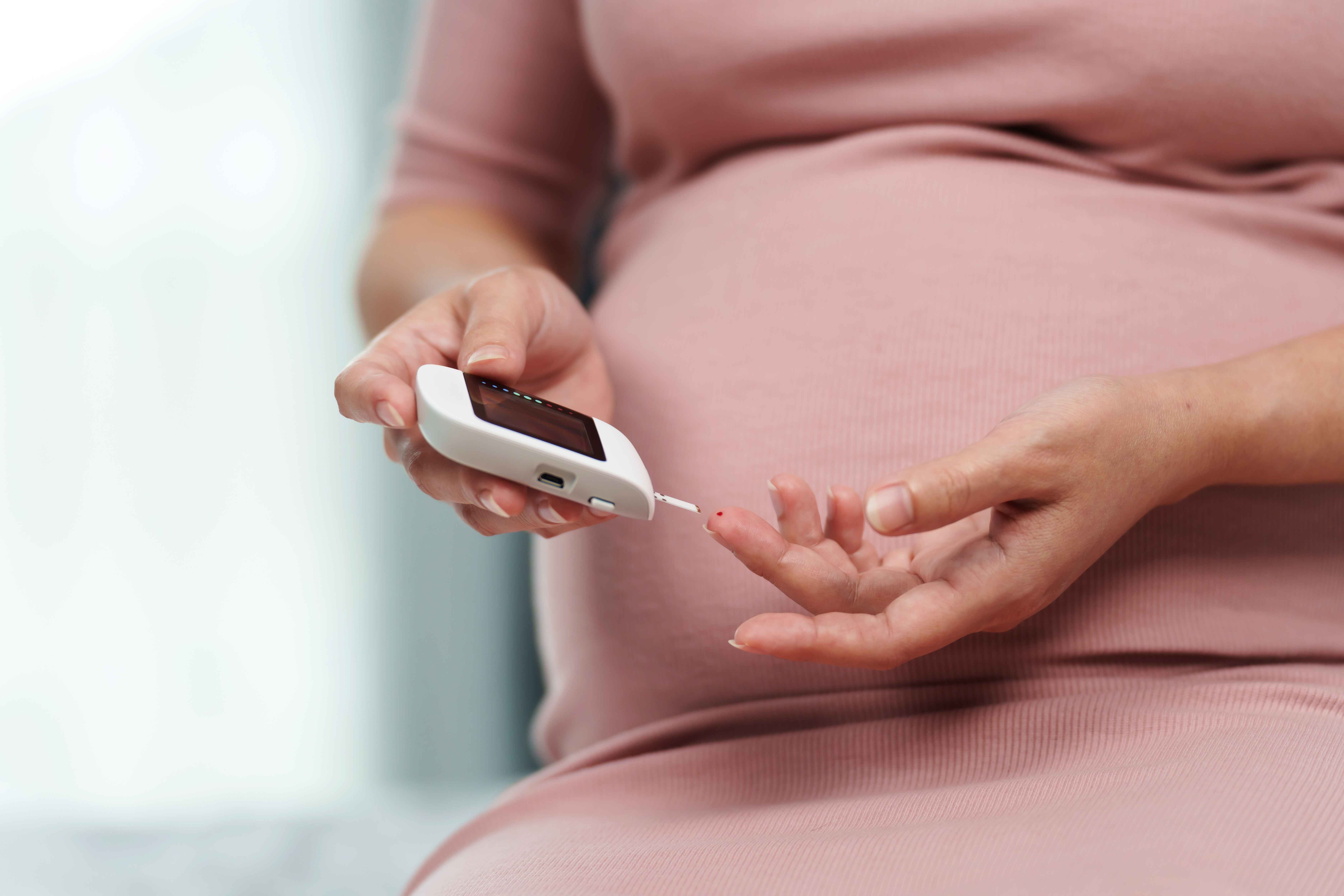Gestational Diabetes: Symptoms, Causes & Treatment

What is Gestational Diabetes?
Women may develop gestational diabetes mellitus during pregnancy. The organ that provides the foetus with water and nourishment, the placenta, is thought to create hormones that prevent the mother from using insulin as intended, despite the fact the precise aetiology of the condition is uncertain. The hormone insulin is required by the body to transform sugar, or glucose, into energy that the cells can utilise.
Rather than being used by the mother's and foetus’s cells, glucose accumulates in the blood as a result of the placenta's growth and increased production of these hormones during the pregnancy.
Causes of Gestational Diabetes
Why some women develop gestational diabetes while others do not is still a mystery to researchers. Pregnancy is frequently influenced by excess weight.
Blood sugar levels are typically regulated by several hormones. However, the body finds it more difficult to properly handle blood sugar during pregnancy due to changes in hormone levels. The result is an increase in blood sugar.
Symptoms of Gestational Diabetes
Gestational diabetes typically shows no outward symptoms or indicators. Symptoms may include increased thirst and increased frequency of urination.
When to see a doctor for Gestational Diabetes?
As part of your prenatal care during your pregnancy, your doctor should screen you for gestational diabetes. You could require more regular examinations if you develop gestational diabetes. After birth and again after six weeks, your doctor should check your blood sugar levels to make sure they have returned to normal. It's a good idea to have frequent blood sugar testing after having gestational diabetes.
After receiving a gestational diabetes diagnosis, you should contact your doctor as soon as possible if:
- Blood sugar cannot be controlled.
- You've had diarrhea or been vomiting for more than six hours.
- Your blood sugar level consistently exceeds the prescribed level prescribed by your physician.
- Your blood sugar level is consistently below what your doctor has prescribed.
- You have low blood sugar symptoms, which include sweating, trembling, weakness, intense hunger, mild nausea, headaches, dizziness, and disorientation.
Gestational Diabetes Risk Factors
Among the risk factors that increase the risk of gestational diabetes are
- Being overweight
- Absence of physical activity
- Possessing prediabetes
- Having had gestational diabetes in a past pregnancy
- Having the syndrome of polycystic ovary
- Having a diabetic in one's immediate family
- Having previously given birth to a child that weighed more than nine pounds (4.1 kg)
Gestational Diabetes Complications
Pregnancy-related diabetes may put your unborn child at risk for:
- Excessive weight at birth. An excessively big infant might result from blood sugar levels that are greater than normal. Babies that weigh nine pounds or more are considered very large and are more likely to require a C-section delivery, become stuck in the birth canal, or suffer birth complications.
- Premature (early) birth. Early labour and delivery before the due date may be more likely in those with high blood sugar. Or, given the size of the baby, an early birth may be advised.
- Severe respiratory problems. Breathing difficulties are associated with respiratory distress syndrome in babies delivered prematurely.
- Low glucose levels, or hypoglycaemia. Hypoglycaemia, or low blood sugar, can occasionally strike new-borns soon after delivery. Seizures may result in severe hypoglycaemia episodes in the infant. An intravenous glucose solution and prompt feedings can help bring the baby's blood sugar back to normal.
- Type 2 diabetes and obesity in later life. Type 2 diabetes and obesity are conditions that babies are more likely to have later in life.
- Stillbirth. Premature or soon after birth, a baby may die from untreated gestational diabetes.
Moreover, gestational diabetes may make you more susceptible to preeclampsia and high blood pressure as well as undergoing a C-section and developing diabetes in the future.
Gestational Diabetes Diagnosis
Diagnosis for gestational diabetes usually occurs between 24 to 28 weeks of pregnancy. Your doctor screens for diabetes using one of the tests below:
Screening tests may vary slightly depending on your health care provider but generally include:
- Initial glucose challenge test. For this test, you are required to come to the medical lab without having had anything to eat or drink. You will have your blood sugar level measured and then be asked to drink a syrupy glucose solution. After an hour, your blood sugar level will be tested again.
- Follow-up glucose tolerance testing. This test is similar to the one before it. However, the solution has more sugar in it, and your blood sugar levels will be tested every hour for three hours.
Gestational Diabetes Treatment
Pregnancy-related diabetes is treated with modifications in lifestyle, blood sugar tracking, and medication.
Controlling your blood sugar levels promotes good health for both you and your child. You can also prevent difficulties throughout pregnancy and delivery by practicing close management.
Insulin may be necessary for certain pregnant women with gestational diabetes to achieve their blood sugar goals. Some doctors advise using oral medication to regulate blood sugar levels.
Gestational Diabetes Prevention
Preventing gestational diabetes is a non-guaranteed endeavour. These healthful behaviours may lower your chance of acquiring gestational diabetes.
- Consume a nutritious diet
- Exercise
- Start your pregnancy at a healthy weight
- Do not gain more weight than recommended
References
Kampmann, U., Madsen, L. R., Skajaa, G. O., Iversen, D. S., Moeller, N., & Ovesen, P. (2015). Gestational diabetes: a clinical update. World journal of diabetes, 6(8), 1065.
Buchanan, T. A., Xiang, A., Kjos, S. L., & Watanabe, R. (2007). What is gestational diabetes?. Diabetes care, 30, S105.
McIntyre, H. D., Catalano, P., Zhang, C., Desoye, G., Mathiesen, E. R., & Damm, P. (2019). Gestational diabetes mellitus. Nature reviews Disease primers, 5(1), 47.
Catalano, P. M. (2014). Trying to understand gestational diabetes. Diabetic Medicine, 31(3), 273-281.
Sweeting, A., Wong, J., Murphy, H. R., & Ross, G. P. (2022). A clinical update on gestational diabetes mellitus. Endocrine reviews, 43(5), 763-793.
Lende, M., & Rijhsinghani, A. (2020). Gestational diabetes: overview with emphasis on medical management. International journal of environmental research and public health, 17(24), 9573.
Meet our doctors from the Mom care department















